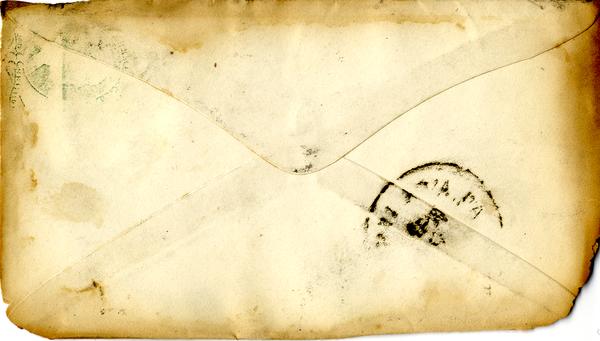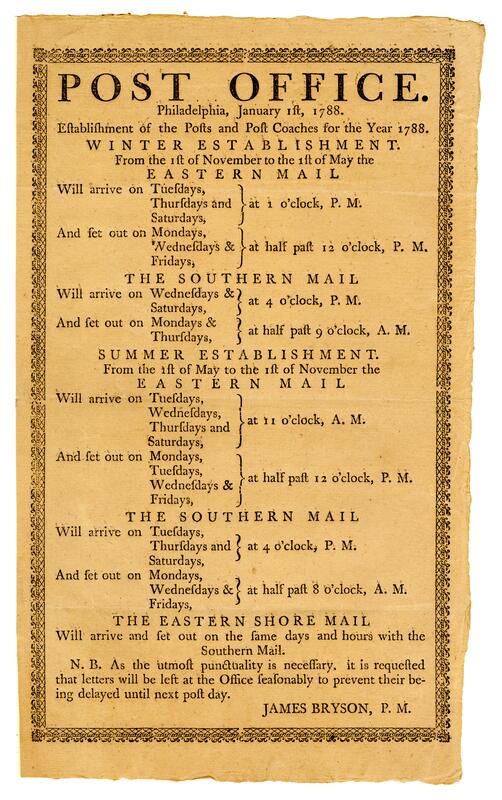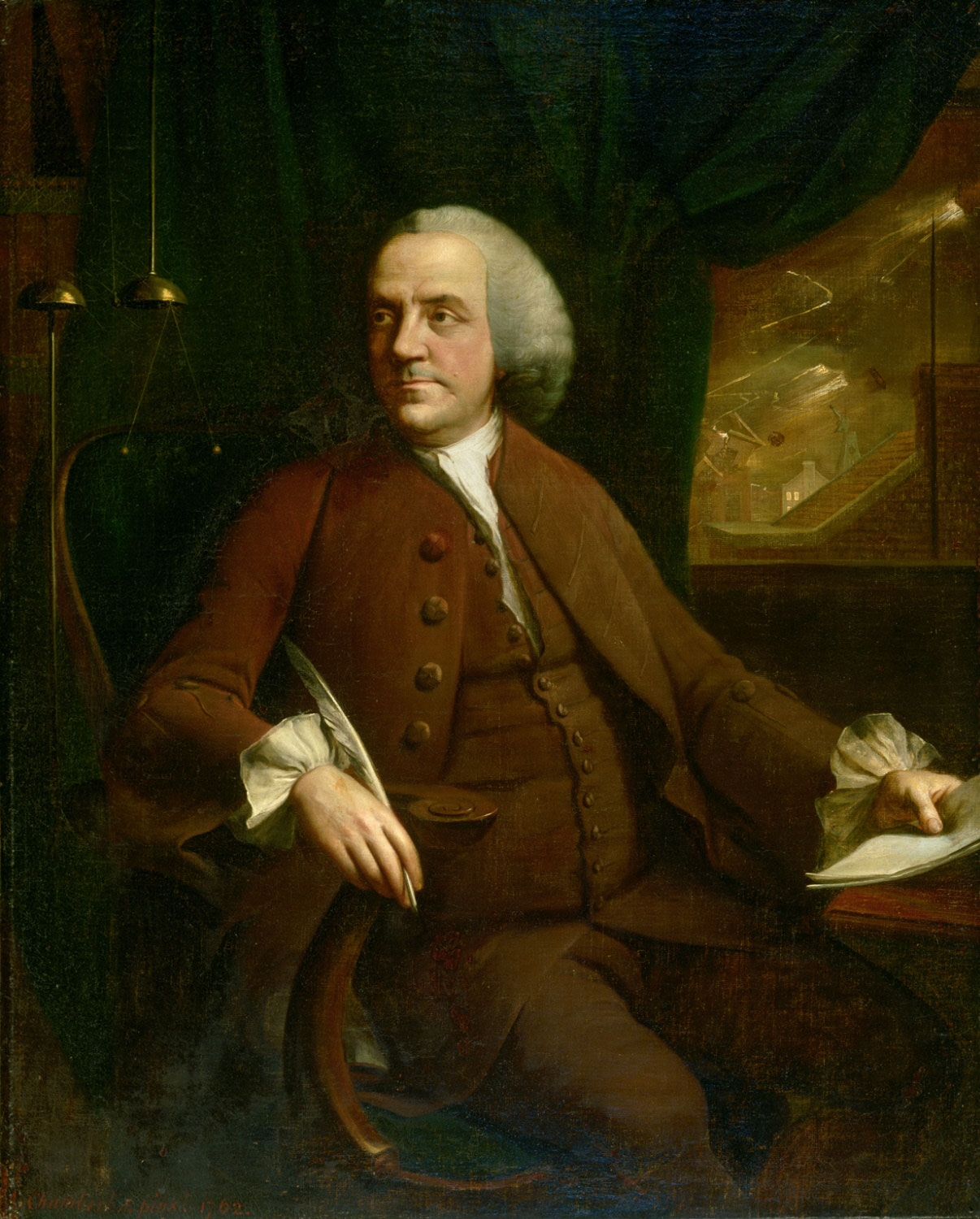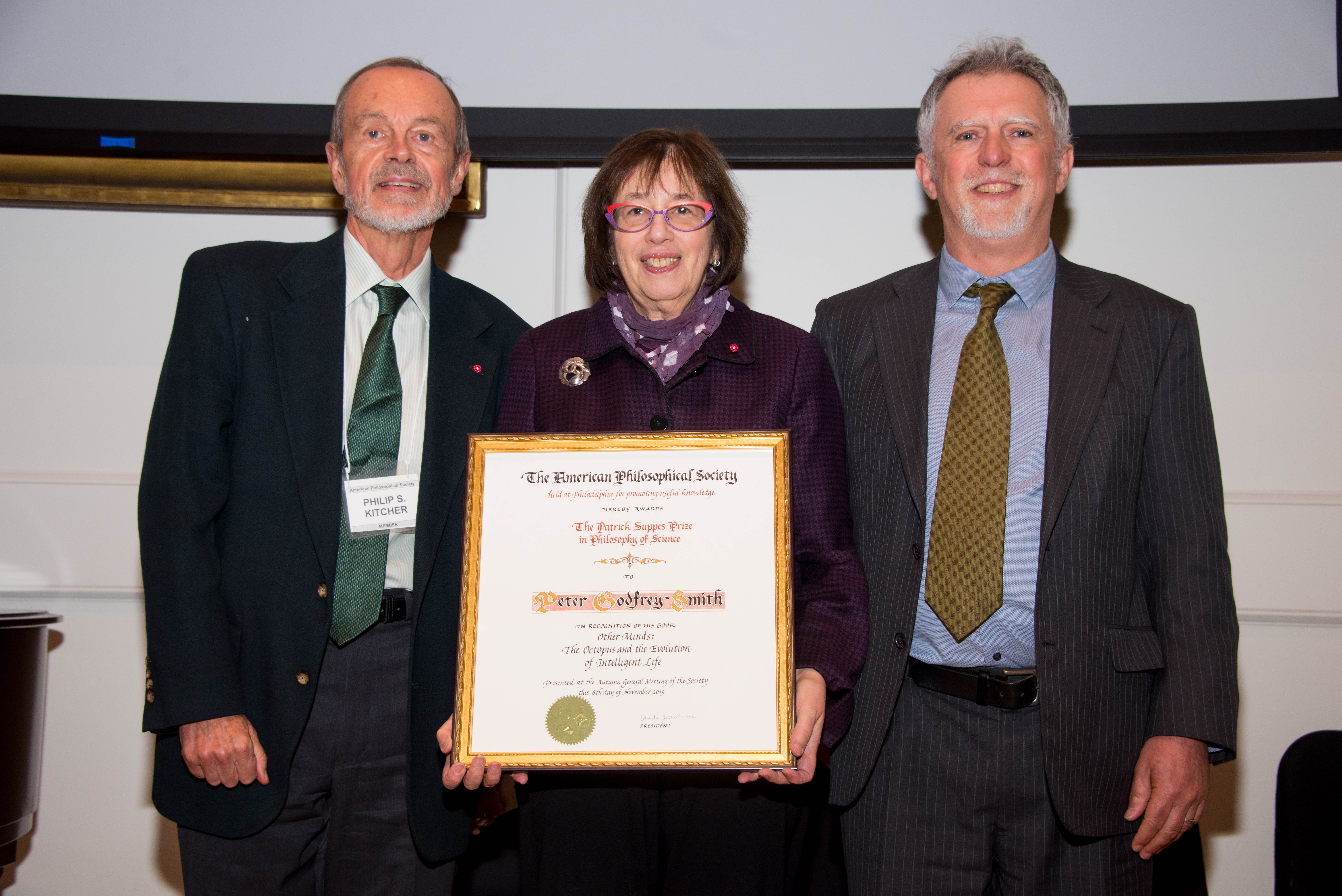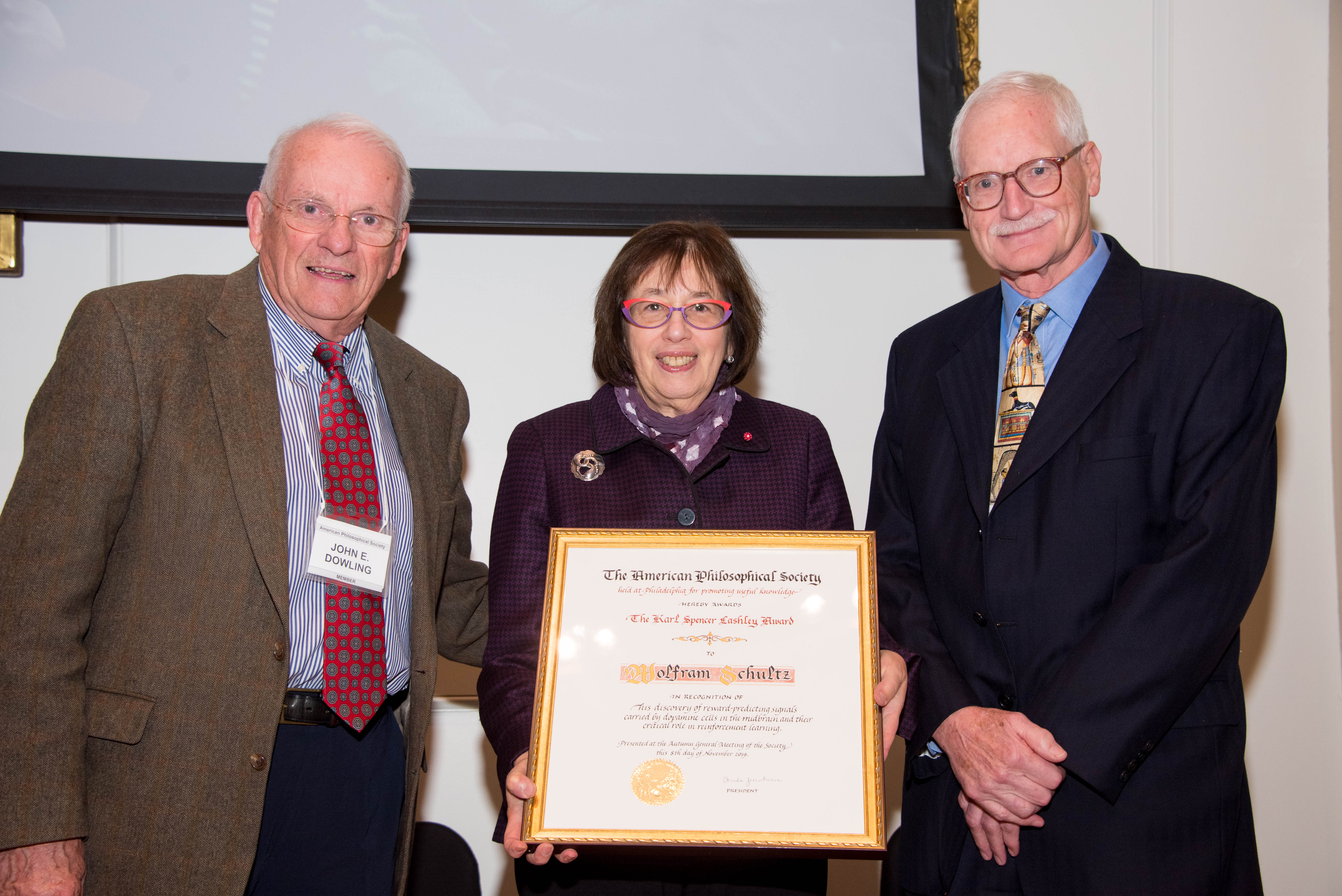New Members for 2025
The American Philosophical Society has extended invites of membership to newly elected members for 2025. Election to the American Philosophical Society honors extraordinary accomplishments in all fields. Read more about this year's election.
Further Reading
For other news about Members and the APS please visit our Publications page, specifically the annual American Philosophical Society News.
June 2025
Gayatri Spivak (APS 2007) receives 2025 Holberg Award in recognition of her groundbreaking work in the fields of literary theory and philosophy.
May 2025
Ithzak Perlman (APS 1997) and Toby Perlman awarded the Samuel Simons Sanford Medal by Yale School of Music in recognition of their lifelong commitment to music performance and education.
Philip Kitcher (APS 2018) awarded the BBVA Foundation Frontiers of Knowledge Award in honor of his impact as a 'humanist intellectual' whose work "addresses a broad spectrum of the core questions of our time."
Henry Louis “Skip” Gates (APS 1995) wins Newberry Award for leaders in the Humanities.
Katalin Karikó (APS 2024) receives Semmelweis Medal by the Medical University of Vienna in recognition of her pioneering contributions to medical science.
Mary Beth Norton (APS 2010) honored with Harvard Kenneth C. Griffin Graduate School of Arts & Sciences Centennial Medal, presented to alumni who have made fundamental and lasting contributions to knowledge, their disciplines, their colleagues and society.
Douglas Hofstadter (APS 2009) to receive Choose Creativity's Curious Cognitive Explorer Award.
Daron Acemoglu (APS 2021) appointed to lead MIT’s new James M. and Cathleen D. Stone Center on Inequality and Shaping the Future of Work, launching fall 2025.
Steven Chu (APS 1998) and Darren Walker (APS 2021) receives 2025 Ellis Island Medal of Honor, awarded by the Ellis Island Honors Society.
Elizabeth Alexander (APS 2020), Darren Walker (APS 2021), and Michael Bloomberg (APS 2015) named to the TIME100 Philanthropy 2025 list—Alexander for “championing diversity in the arts,” Walker for "driving transformation," and Bloomberg as 2024’s biggest donor.
Katalin Karikó’s (APS 2024) pioneering work in mRNA vaccine technology is honored in the new exhibit, Forever Forward, at Vienna’s Museum of Medical History, the Josephinum.
Douglas S. Massey (APS 2004) granted the 2025 Princess of Asturias Award for Social Sciences by the Princess of Asturias Foundation, to be presented in October.
Robbert Dijkgraaf (APS 2013) and Terrence J. Sejnowski (APS 2025) elected as Fellows of the Royal Society.
APS Members Receive Honorary Degrees
Frances H. Arnold (APS 2018); Doctor of Science, Yale University
Henry Louis “Skip” Gates (APS 1995); Doctor of Humanities, Yale University
Annette Gordon-Reed (APS 2019); Doctor of Letters, Yale University
Lonnie Bunch (APS 2020); Doctor of Humane Letters, University of Pennsylvania
Lene Hau (APS 2023); Doctor of Sciences, University of Pennsylvania
Sherrilyn Ifill (APS 2025); Doctor of Laws, Princeton University
Nancy Weiss Malkiel (APS 2019); Doctor of Humane Letters, Princeton University
Alondra Nelson (APS 2020); Doctor of Humane Letters, Amherst College
Vinton G. Cerf (APS 2008); Doctor of Science, Amherst College
William Kentridge (APS 2012); Doctor of Fine Arts, Brown University
January 2025
Larry M. Bartels (APS 2019), Bonnie L. Bassler (APS 2012), Helen M. Blau (APS 2018), Emery N. Brown (APS 2023), Ingrid Daubechies (APS 2003), Cynthia Dwork (APS 2016), and Wendy L. Freedman (APS 2007) are recipients of the 2025 National Medal of Science. David R. Walt (APS 2023) is a recipient of the 2025 National Medal of Technology and Innovation. The National Medal of Science recognizes "groundbreaking discoveries and innovations that tackle humanity's most urgent needs," while the National Medal of Technology and Innovation "honors visionaries whose advancements have revolutionized industries, driven economic growth and strengthened the nation's global competitiveness."
October 2024
John J. Hopfield (APS 1988) is the winner of the 2024 Nobel Prize in Physics (shared with Geoffrey Hinton) “for foundational discoveries and inventions that enable machine learning with artificial neural networks.”
Gary Ruvkun (APS 2019) won the 2024 Nobel Prize in Physiology or Medicine (shared with Victor Ambros) "for the discovery of microRNA and its role in post-transcriptional gene regulation."
July 2024
Kwame Anthony Appiah (APS 2001), Gerd Gigerenzer (APS 2016), and Catharine MacKinnon (APS 2023) were elected to the British Academy as International Fellows. Election to the British Academy honors distinction in the humanities and the social sciences.
APS President Roger Bagnall (APS 2001) received the Honorary Degree of Doctor of Letters from the University of Reading.
Frances Arnold (APS 2018) is the winner of the American Chemical Society's highest honor, the Priestly Medal, "for her pioneering contributions to the development of directed evolution as a method for chemical and biological design."
APS Members Adi Shamir (APS 2019), Joanne Chory (APS 2015), and Martin Rees (APS 1995) are 2024 Wolf Prize laureates. It is awarded "to Scientists and Artists for their achievements in the interest of mankind and friendly relations amongst peoples."
June 2024
"Economics and Beyond" at Harvard will feature Daron Acemoglu (APS 2021)
The Kohli Foundation for Sociology is delighted to announce Michèle Lamont (APS 2024) is this year’s laureate of the Kohli Prize for Sociology.
Mary Robinson (APS 1999), a former lawyer and senator, former president of Ireland, former United Nations High Commissioner for Human Rights, and current Chair of The Elders, is awarded the Tang Prize in Rule of Law.
Living Classrooms Foundation is proud to host a special event featuring David M. Rubenstein (APS 2019)
Paul Alivisatos (APS 2015) shares 2024 Kavli Prize in Nanoscience
Sara Seager (APS 2018) shares 2024 Kavli Prize in Astrophysics
Anthony Fauci (APS 2001) says empathy motivated his medical career but an old phrase from high school kept him going.
Retired judge David Tatel (APS 2007) issues a stark warning about the Supreme Court
Kwame Anthony Appiah (APS 2001) is the new Hans Blumenberg Professor
John Wilmerding (APS 2006) died on June 6, 2024, in New York City, NY, at the age of 86. He was a towering figure in American art whose eclectic career as a scholar, museum curator and collector was instrumental in elevating the cultural significance and market value of painters such as Winslow Homer, Thomas Eakins and Fitz Henry Lane.
Edward C. Stone (APS 1993) died on June 9, 2024, in Pasadena, CA, at the age of 88. He was the visionary physicist who dispatched NASA’s Voyager spacecraft to run rings around our solar system’s outer planets and, for the first time, to venture beyond to unravel interstellar mysteries.
May 2024
Brandeis Undergraduate Commencement Address by Ken Burns (APS 2011)
Elizabeth Loftus (APS 2006), distinguished professor of psychological science and criminology, law & society, who made the event possible through the donation of her American Philosophical Society Patrick Suppes Prize money, kicked off the UCI discussion of "Reimagining the Justice System".
Kwame Anthony Appiah (APS 2001) has been elected to the Fellowship of the Royal Society, the oldest scientific academy in continuous existence.
Vicki L. Chandler (APS 2015), chief academic officer and provost at Minerva University, will address the Drexel University College of Medicine class of 2024 at its commencement ceremony on May 9.
Stuart H. Orkin (APS 2017) has won the Shaw Prize in Life Science & Medicine
Former Executive Officer, Keith S. Thomson (APS 2011), has a new book Murder in Cottisthorpe
Mary Beth Norton gave a virtual discussion of her latest book, 1774: The Long Year of Revolution
Glenn Loury has published new memoir, “Late Admissions: Confessions of a Black Conservative”
Peter Dougherty (APS 2023) receives honorary degree from La Salle.
Cecilia Rouse (APS 2021) was elected to the National Academy of Science.
James H. Simons (APS 2007) died on May 10, 2024, in New York City, NY, at the age of 86. He was a prizewinning mathematician who abandoned a stellar academic career, then plunged into finance — a world he knew nothing about — and became one of the most successful Wall Street investors ever.
Robert H. Dennard (APS 1997) died on April 23, 2024, in Sleepy Hollow, NY, at the age of 91. He was an engineer who invented the silicon memory technology that plays an indispensable role in every smartphone, laptop and tablet computer.
J. D. Hawkins died in February 2024, in London, UK, at the age of 83. He was one of the world’s leading scholars of the languages of ancient Turkey.
April 2024
Joseph Francisco to Give Pulay Lecture, 'Water in the Atmosphere,'
Kwame Anthony Appiah has won the the Don M. Randel Award for Humanistic Studies
Roy Vagelos received an Honorary Degree from Dartmouth
The Smithsonian celebrates Women’s History Month by featuring Native Rights Champion Suzan Shown Harjo
Helen Hennessy Vendler (APS 1992) died on April 23, 2024, in Laguna Niguel, CA, at the age of 90. She was known for her method of close reading, going methodically line by line, word by word, to expose a poem’s roots.
Julius Adler (APS 19989 died on April 2, 2024, in Madison, WI, at the age of 94. He was best known professionally for his groundbreaking research on chemotaxis — the relationship between chemical stimuli and organism behavior — first in bacteria and later in fruit flies.
Ellen Ash Peters (APS 1993) died on April 16, 2024, in West Hartford, CT, at the age of 94. A copy of the Yale Law School obituary is pasted below. She was a former chief justice of the Connecticut Supreme Court and a groundbreaking figure among women in the law.
Lubert Stryer (APS 2006) died on April 8, 2024, in Stanford, CA, at the age of 86. He made fundamental discoveries in fluorescence spectroscopy and vision, established structural biology at Stanford, and uplifted young scientists.
March 2024
David Rubenstein is the new controlling owner of the Baltimore Orioles
Phillips Lecture will feature David M. Rubenstein
A Supreme Legacy: Linda Greenhouse on 45 Years Covering the High Court
Andrea Ghez and Claudia Goldin are among the recipients of the 2024 Alumni Awards
Martha Nussbaum to receive 2024 Norman Maclean Faculty Award
Joe Francisco to Receive Theodore William Richards Medal
Laurie Glimcher is now a strategic advisor to the J.P. Morgan Life Sciences Private Capital team
Jeffrey Gordon, MD, is the recipient of the 2024 Mechthild Esser Nemmers Prize in Medical Science at Northwestern University
The Hana and Franciso J. Ayala Center for Science, Technology, and Religion commemorated the 90th anniversary of Francisco Ayala’s birth at the Pontifical Comillas University in Madrid, Spain, on March 12, 2024. The event was entitled “Frontiers of the Universal: Towards a Symphony of Science, Art, Faith, and Knowledge Economy to Mobilize the Wonder of the Natural World in Benefit of Humanity.” Executive Officer of the APS, Robert M. Hauser (APS 2005) spoke about the contributions of Francisco J. Ayala (APS 1984) to the American Philosophical Society. As guest of honor, Dr. Hauser was awarded the medal of the Ayala Center, the first such award ever given.
Walter Massey (APS 1991) featured in article as a Physicist With a Higher Calling
Henry Louis Gates Jr. (APS 1995) Unpacks Black Literature’s ‘Black Box’ in his latest book.
PACSW Women We Admire will feature UC Berkeley Chancellor Carol T. Christ (APS 2013)
Brandeis University awarded honorary degrees to Ken Burns (APS 2011) and Ruth Simmons (APS 1997)
Daniel Kahneman (APS 2004) died on March 27, 2024, likely in New York, NY, at the age of 90. He helped pioneer a branch of the field that exposed hard-wired mental biases in people’s economic behavior. The work led to a Nobel.
Richard Serra (APS 2012) died on March 26, 2024, in Orient, NY, at the age of 85. He was an American artist known for his large-scale abstract sculptures made for site-specific landscape, urban, and architectural settings, whose work has been primarily associated with Postminimalism.
Marjorie Perloff (APS 2012) died on March 24, 2024, in Los Angeles, CA, at the age of 92. She was one of America’s leading poetry critics.
Estella Bergere Leopold (APS 2024) died on February 25, 2024, in Seattle, WA, at the age of 97. She was a botanist who examined ancient pollen to illuminate the effects of climate change and who, as the last child of the pioneering environmentalist Aldo Leopold, helped preserve her father’s legacy as a founder of the modern conservation movement.
February 2024
Jeffrey I. Gordon (APS 2014) of Washington University School of Medicine in St. Louis, has received the 2024 Mechthild Esser Nemmers Prize in Medical Science from Northwestern University.
Sheila E. Blumstein gave the 2024 Dr. Donald G. Doehring Memorial Lecture
Joanne Chory (APS 2015) will receive the Franklin Institute's Benjamin Franklin Medal in Life Science for her achievements in plant science.
Kenneth C. Frazier (APS 2018) will become a fellow of the Harvard Corporation, the senior governing board.
Angela Creager (APS 2020) has received a grant from the National Endowment for the Humanities (NEH) in a round of awards to humanities projects nationwide.
Michael S. Brown (APS 1987) will address graduates and their guests at Northwestern’s Feinberg School of Medicine’s 165th commencement ceremony on Monday, May 13.
Rice University’s Ruth Simmons (APS 1997), a President’s Distinguished Fellow, has accepted an invitation to join the Barbara Bush Houston Literacy Foundation’s Board of Directors.
Venki Ramakrishnan (APS 2020) discusses ribosomes, resilience during FSU public lecture
Ernesto Zedillo will deliver the 2024 Anthony C. Janetos Memorial Distinguished Lecture.
Robert Badinter (APS 2009) died on February 9, 2024, in France, at the age of 95. He was a French lawyer and former justice minister who led the fight to abolish the death penalty in France.
January 2024
Danielle Allen (APS 2015) has joined the board of directors at Monticello.
The National Academy of Sciences has recognized two APS members with awards: Stanislas Dehaene (APS 2010) received the Atkinson Prize in Psychological and Cognitive Sciences and Kimbery Prather (APS 2022) received the NAS Award in Chemical Sciences.
Yale Chief Executive Leadership Institute Presents Shirley Tilghman (APS 2000), 19th President of Princeton University, with the Yale Legend in Leadership Award
David Pierpont Gardner (APS 1989) died on January 2, 2024, in Park City, UT, at the age of 90. He served as president of the University of Utah and later president of the University of California.
As part of our annual search, we found these members passed previously:
Jacob Ziv (APS 2003) died on March 25, 2023, in Israel, at the age of 91. He was an Israeli electrical engineer and information theorist who developed the LZ family of lossless data compression algorithms alongside Abraham Lempel.
Frank H. Shu (APS 2003) died on April 22, 2023, in Atherton, CA, at the age of 79. He was an astrophysicist who is credited with making pivotal contributions to our understanding of galaxies and star formation.
Daniel Roche (APS 2009) died on February 19, 2023, in France, at the age of 88. He was a "professor who profoundly renewed the social and cultural history of modern Europe."
Donald R. Kelley (APS 1995) died on August 24, 2023, in New Brunswick, NJ, at the age of 92. He was a scholar of, in his words: "language, law, and history in the French Renaissance".
John S. Chipman (APS 2000) died in 2022, at the age of 96. Other details of his death are unknown. He was an economist who was a noted expert on the econometrics of international trade.
December 2023
Robert M. Solow (APS 1980) died on December 21, 2023, in Lexington, MA, at the age of 99. American economist and Nobel laureate whose work on the theory of economic growth culminated in the exogenous growth model named after him.
John G. A. Pocock (APS 1994) died on December 12, 2023, at the age of 99. Pocock wove philosophy, political science, and history into a program in political and moral thought that Johns Hopkins University is known for today.
Edgar S. Woolard, Jr. (APS 1996) died on December 4, 2023, in Palm Beach Gardens, FL, at the age of 89. He was the former CEO and chair of DuPont who led the company through tremendous restructuring in the early 1990s.
Sandra Day O'Connor (APS 1992) died on December 1, 2023, in Phoenix, AZ, at the age of 93. She was the first woman to serve as a Justice on the U.S. Supreme Court.
November 2023
John L. Heilbron (APS 1990) died on November 5, 2023, in Padua, Italy, at the age of 89. He was a historian of science whose books, including a biography of Galileo, helped to debunk several myths.
Emmanuel Le Roy Ladurie (APS 1979) died on November 22, 2023, in Paris, France, at the age of 94. He led a movement that rejected historiography’s traditional emphasis on great events and leaders in favor of mining the “mental universe” of peasants, merchants and clergymen.
October 2023
Hans E. Mayer (APS 1978) died on October 21, 2023, in Klausdorf, Germany, at the age of 91. Hans Mayer was an international expert on the history of the Crusades.
Natalie Zemon Davis (APS 2011) died on October 21, 2023, in Toronto, ON, at the age of 94. She wrote of peasants, unsung women, border crossers and, most popularly, Martin Guerre, a 16th-century village impostor recalled in a 1980s movie.
Louise Glück (APS 2014) died on October 13, 2023, in Cambridge, MA, at the age of 80. Acclaimed as one of America’s greatest living writers, she blended deeply personal material with themes of mythology and nature. She won the Nobel Prize in Literature in 2020.
September 2023
Gloria Ferrari Pinney (APS 2003) died on September 18, 2023, likely in Lawrenceville, NJ, at the age of 82. She was an internationally renowned classical archaeologist and art historian.
Evelyn Fox Keller (APS 2006) died on September 22, 2023, in Cambridge, MA, at the age of 87. A copy of the MIT obituary is pasted below. She was a distinguished and groundbreaking philosopher and historian of science.
Victor R. Fuchs (APS 1990) died on September 16, 2023, in Palo Alto, CA, at the age of 99. He demonstrated that the real problem facing the country was not health care coverage but health care costs; America, he said, was spending more and more without achieving better health outcomes.
August 2023
John Warnock (APS 2009) died on August 19, 2023, at the age of 82. Dr. Warnock played a seminal role in the history of computing as co-founder and chief executive of Adobe Inc., helping create the Portable Document Format (PDF) and software that turned computers into digital printing presses, radically reshaping office life and publishing.
Richard M. Goody (APS 1997) died on August 3, 2023, in Cockeysville, MD, at the age of 102. Dr. Goody spearheaded a program referred to as "Global Habitability" to examine the factors affecting the Earth's ability to sustain life, principally through biogeochemical cycles and climate. He was described as "the grandfather of the International Geosphere-Biosphere Program."
July 2023
Professor Laura Kiessling (APS 2017) joins the Advisory Board of RSC Chemical Biology
Ruth J. Simmons (APS 1997) named 2023 Jefferson Lecturer in the Humanities
Former BBC director general Mark Thompson (APS 2017) knighted
Penn State chemist Stephen Benkovic (APS 2002) named Atherton Professor
Éva Tardos (APS 2020) has been awarded the Donald E. Knuth Prize
Rudy Marcus (APS 1990) celebrated his 100th birthday with a day of festivities at Caltech
Stephen M. Stigler (APS 2006) has published Casanova’s Lottery: The History of a Revolutionary Game of Chance
Patrick Spero (APS 2019) on panel to discuss The Founding Fathers’ Legacy Series: Unpacking the Complex Truth
APS member Lewis M. Branscomb (APS 1970) died on May 31, 2023, in Redwood City, CA, at the age of 96. He was an American physicist, government policy advisor, and corporate research manager. He was best known for being head of the National Bureau of Standards and, later, chief scientist of IBM; and as a prolific writer on science policy issues.
APS member André Watts (APS 2020) died on July 12, 2023, in Bloomington, IN, at the age of 77. With a performance career that spanned over 60 years, he was internationally celebrated as a musical and artistic legend.
2023 News Archive
2022 News Archive
2021 News Archive
2020 News Archive

